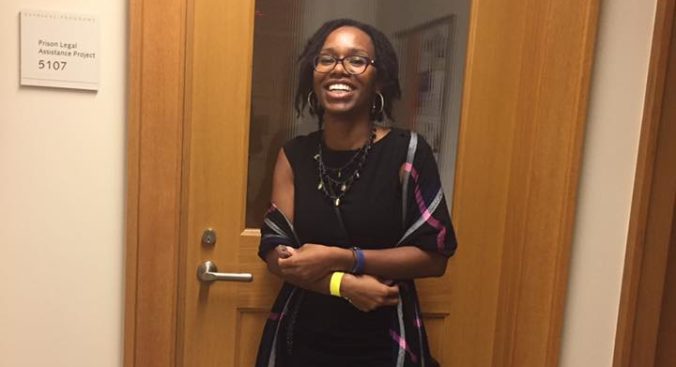Wednesday, April 17th is the Harvard Women’s Law Association’s Shatter the Ceiling Awards ceremony. Each spring, the WLA recognizes the people who represent the gold standard for promoting inclusiveness and equality, both at Harvard Law School and beyond.
Shanell Lavery, program manager of the Harvard Prison Legal Assistance Project (PLAP), is being awarded with WLA’s Shatter the Ceiling Award for Staff Excellence in Promoting Equity and Justice. Lavery is a tireless advocate and the work PLAP does would not be possible without her. We are so grateful for her leadership and hard work.
Below are a few important reflections on Shanell Lavery’s work with PLAP:
“Shanell hit the ground running at PLAP. She has a deft touch with students, striking that important balance of supporting students as they operate a student-led organization, while being hands-on enough to ensure that the office runs smoothly. She fulfills an important role for us as the face of the office, interacting with students, interns, prisoners, other HLS offices and staff, prison officials, and parole officials. Across all of those interactions, she demonstrates real professionalism, which ensures that the office runs smoothly and also serves as a model for law students. We’re lucky to have her.”
– Joel Thompson, PLAP Supervising Attorney
“Shanell goes above and beyond for PLAP. She keeps the office running so smoothly that we often don’t even realize just how much she does. She often gives up her own time to meet with people or help with the office after hours. She also knows virtually every member of PLAP (not an easy task in such a large organization), and has been a wonderful resource and friend. I have loved working with Shanell and I will miss working with her after I graduate.”
– Kaitlyn Gerber, 2018-19 PLAP Executive Director
“In addition to being amazing at her job, Shanell is an amazing mother, commuting all the way from Providence to spend her days with us, but always getting her kids to school before she comes here and supporting them, alongside her wife, every step of the way. In daily work, Shanell is on top of so many thankless tasks that student attorneys may never even think about because she’s there behind the scenes. Every year, she deals with the logistical nightmare of getting every single member of PLAP approved by DOC. Having the system set up through Shanell means that we don’t run into any issues when we show up at the door. Our work could not happen without her.”
– Rachel Kroll, 2018-19 Legal Resources Manager
This year’s Shatter the Ceiling Award honorees include:
Shanell Lavery, for Staff Excellence in Fostering Equity and Justice
Da Lin, for Excellence in Fostering an Inclusive Classroom
Judge Lauren Reeder, for Alumni Excellence
and All Professors who Signed the Kavanaugh Letter, for Excellence in Promoting Gender Equity (Judge Nancy Gertner will be accepting on behalf of this group)



